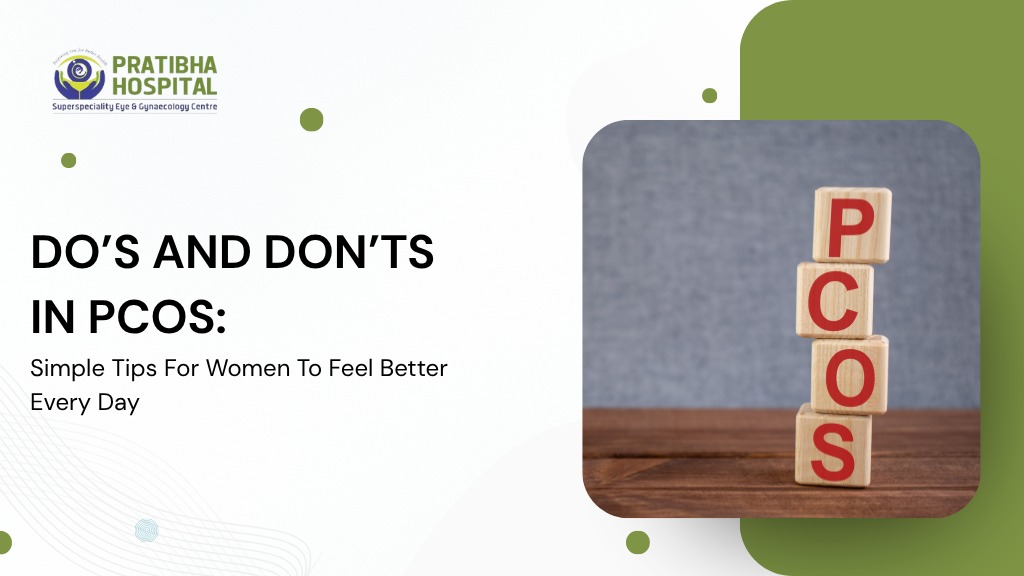Do’s and Don’ts In PCOS: Simple Tips For Women To Feel Better Every Day
Polycystic Ovary Syndrome, or PCOS, is affecting women around the world, and the count reaches the millions.
PCOS is a common condition, but dealing with it every day can be tough. It can cause problems like irregular periods, pimples, hair fall, weight gain, and mood changes—things that can really affect your routine.

The good part?
Just some changes in your everyday habits can make a huge difference.
In this blog, we’ll share some easy do’s and don’ts to help manage PCOS with clear tips that can help you to get rid of this issue.
What Is PCOS And Why Lifestyle Changes Matter
PCOS (Polycystic Ovary Syndrome) is a condition caused by hormonal imbalance where the ovaries produce multiple male hormones (androgens). It’s linked to problems like :
- Irregularity in ovulation
- Insulin is not working properly
- Acne and thick hair growth
- Difficulty in losing weight
- Fertility issues
There’s no one-size-fits-all treatment, but simple lifestyle adjustments in your diet, routine, sleep, and mindset can help manage your symptoms naturally and effectively.
Do’s In PCOS: What You Should Focus On
1. Eat a Balanced, Low-Glycemic Diet
Choose whole grains, plant-based foods, & healthy fats. Avoid sugar spikes by choosing those food options that don’t raise your blood sugar level.
Good PCOS foods include:
- Oats, healthy whole grains, and brown rice
- Leafy green vegetables
- Eggs, chicken, tofu, and fish
- Nuts, seeds, and olive oil
Why it helps: Managing blood sugar levels improves insulin sensitivity and reduces excess androgen production.
2. Be Physically Active
Exercise is the best way to manage PCOS naturally. It can help you in weight loss, give you good control over sugar, and keep your hormones balanced.

Best exercises for PCOS:
- Active walking
- weight exercises
- Yoga and body stretching
- Aim for a minimum of 30 minutes a day, 5 days a week.
3. Managing emotional imbalance
Stress increases cortisol, which can worsen hormonal imbalance in PCOS. High stress levels also make it harder to manage weight and blood sugar.
Stress-relief ideas:
- Meditation or deep breathing
- Journaling or creative hobbies
- Taking breaks from screens
4. Get good Quality Sleep
Lack of sleep affects hormonal functioning. A regular sleep routine helps your body reset and keeps the body and mind active.
Tips for better sleep:
- No screen exposure an hour before bed
- Keep your room at a good temperature and dim light conditions.
- Sleep and wake at the same time daily
5. Follow Your Doctor’s Advice
Whether it’s taking natural sugar compounds, Vitamin D, or using hormonal birth control for regulating periods, always follow the advice of the specialist. Routine checkups and lab tests (like AMH levels, fasting insulin, or ultrasound) are important for long-term PCOS care.
Don’ts In PCOS: What To Avoid Or Limit
1. Don’t Crash Diet or Skip Meals
Skipping meals might help in losing weight for a temporary period, but it can slow down your body’s natural processes and disturb hormonal functioning. Eating balanced meals at regular times during the day works much better.
2. Avoid Sugary Foods and Processed Junk
Sugar increases insulin levels and leads to more androgen production. Many foods that are packaged consist of extra sugar, even the ones that look healthy, like cereals or flavored yogurt.
Limit:
- Sweets, soda, energy drinks
- White bread, pasta, and pastries
- Fried and oily snacks
3. Keep staying active
A sedentary lifestyle increases the risk of weight gain and insulin resistance, both of which worsen PCOS symptoms. Even short walks or stretching breaks help if you’re desk-bound.
4. Don’t Ignore Irregular Periods
Missing your periods increases the chances of causing problems in the uterus in the future. It’s best to consult a good gynecologist if this is also happening with you.
5. Don’t Neglect Mental Health
Generally, women with PCOS issues experience anxiety, depression, or sometimes low self-esteem. If you are also one of them finding yourself to be mentally drained, talk to a professional.
Also read: Importance Of Mental Wellness In Women’s Reproductive Health
Bonus: Build A Sustainable Routine
You don’t need to change everything within a night. Start with small steps like drinking enough water, cooking a PCOD-friendly meal every day, and walking after taking meals.
with time, you will eventually realize that these habits will become a part of your life.
You can also:
- Track your periods using a PCOS app
- Join support groups or online communities
- Keep a PCOS journal for symptoms and mood
When Should You Seek Medical Help?
If you are done with trying all lifestyle change tips but still struggling with:
- Irregular cycles
- Fertility issues
- Sudden weight gain
- Excess facial hair or hair loss
It’s time to consult a gynecologist, reproductive endocrinologist, or PCOS dietitian. Diagnostic tools like ultrasound scans, HOMA-IR tests, and hormonal blood work can better detect the main issue.
Conclusion
Living with PCOS can be overwhelming, but it’s manageable. These do’s and don’ts of pcos aren’t rules; they’re tools to help you build a life that works with your body, not against it.
Consistency, not perfection, leads to real change. Be kind to yourself, and remember, every step you take counts.







